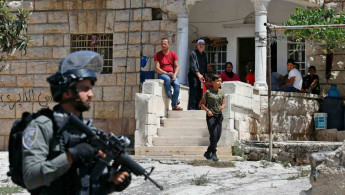Settler aggression spikes as manhunt for suspected Palestinian killers continues
The fatal stabbing of Dvir Sorek has also sparked an angry reaction from settlers in the occupied territory, who have attacked Palestinian cars and property.
The body of the 19-year-old soldier was found on Thursday on the side of the road outside settlement of Gush Etzion, south of Jerusalem. Israeli intelligence are searching for a cell comprising of three assailants, according to Israel’s Channel 12 News.
Israeli security forces have put areas some areas surrounding Hebron under lockdown, fearing a new wave of attacks from the area, according to Israel HaYom.
Dozens of Israeli soldiers and policemen stormed the town of Beit Fajjar on Thursday, raiding homes and seizing surveillance cameras it claimed may reveal the movements of the attackers.
The raid prompted the outbreak of clashes between Beit Fajjar’s residents and Israeli forces.
Twitter Post
|
Prime Minister Binyamin Netanyahu, in the middle of his re-election campaign, visited the site of the attack, condemning the killing as “a terrible thing” and a “terror attack”.
In response to the incident, Netanyahu also travelled to the settlement of Beit El, near Ramallah, to lay a foundation stone for 650 new homes. The expansion project had originally planned to add 296 new housing units.
“Our hands will reach those who seek to harm us, we will strengthen our roots in our homeland,” he said.
The Palestinian Authority criticised Netanyahu’s move, calling it a provocative and hostile violation of international law.
Multiple reports surfaced on Friday morning of Israeli settlers throwing bottles and stones at cars and homes and writing racist graffiti on property calling for revenge against the Palestinians.
It is customary for Israeli authorities to issue heavy handed collective punishments, such as demolishing homes and boosting illegal settlement construction, on entire communities after attacks such as that on Thursday.
Human Rights Watch has called Israel’s collective punishment a war crime.
Netanyahu is making a concerted effort to consolidate and expand the conglomeration of settlements surrounding Jerusalem, which, as part of his election promise, he has vowed to annex.





 Follow the Middle East's top stories in English at The New Arab on Google News
Follow the Middle East's top stories in English at The New Arab on Google News


